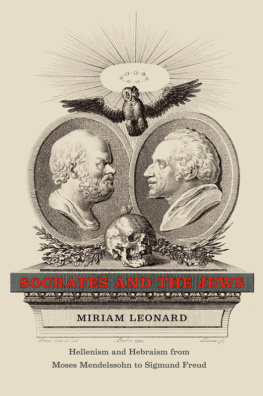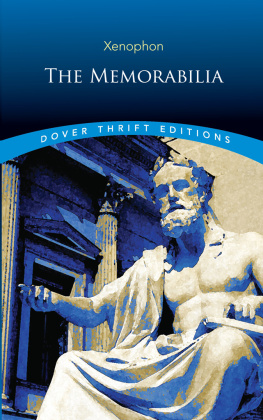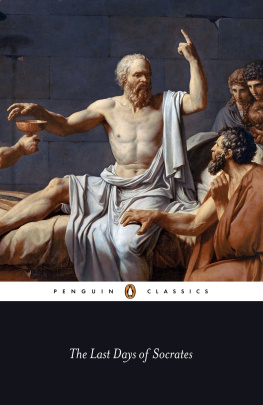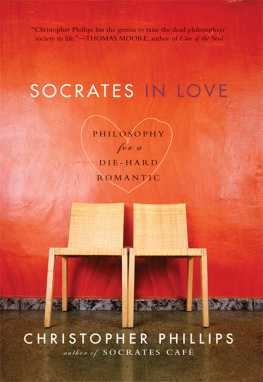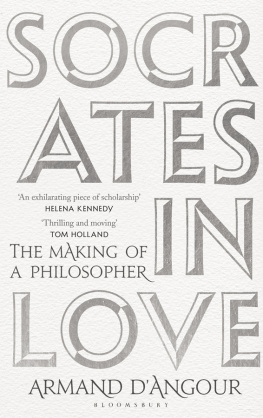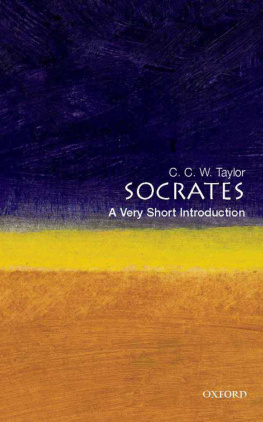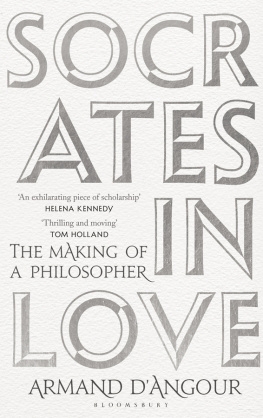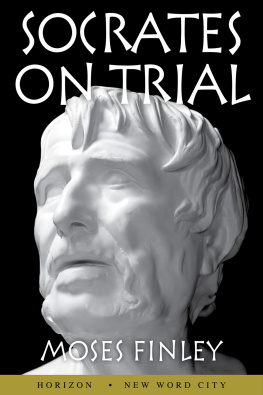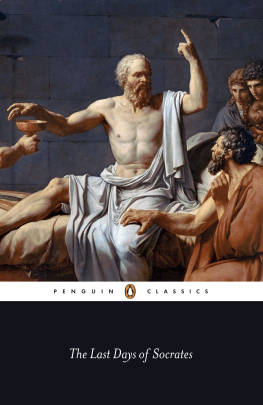Miriam Leonard - Socrates and the Jews
Here you can read online Miriam Leonard - Socrates and the Jews full text of the book (entire story) in english for free. Download pdf and epub, get meaning, cover and reviews about this ebook. year: 2012, publisher: University of Chicago Press, genre: Religion. Description of the work, (preface) as well as reviews are available. Best literature library LitArk.com created for fans of good reading and offers a wide selection of genres:
Romance novel
Science fiction
Adventure
Detective
Science
History
Home and family
Prose
Art
Politics
Computer
Non-fiction
Religion
Business
Children
Humor
Choose a favorite category and find really read worthwhile books. Enjoy immersion in the world of imagination, feel the emotions of the characters or learn something new for yourself, make an fascinating discovery.
- Book:Socrates and the Jews
- Author:
- Publisher:University of Chicago Press
- Genre:
- Year:2012
- Rating:3 / 5
- Favourites:Add to favourites
- Your mark:
- 60
- 1
- 2
- 3
- 4
- 5
Socrates and the Jews: summary, description and annotation
We offer to read an annotation, description, summary or preface (depends on what the author of the book "Socrates and the Jews" wrote himself). If you haven't found the necessary information about the book — write in the comments, we will try to find it.
Socrates and the Jews — read online for free the complete book (whole text) full work
Below is the text of the book, divided by pages. System saving the place of the last page read, allows you to conveniently read the book "Socrates and the Jews" online for free, without having to search again every time where you left off. Put a bookmark, and you can go to the page where you finished reading at any time.
Font size:
Interval:
Bookmark:
Socrates and the Jews
Hellenism and Hebraism from Moses Mendelssohn to Sigmund Freud
MIRIAM LEONARD
University of Chicago Press
Chicago and London
Miriam Leonard is professor of Greek literature and its reception at University College London. She is the author of Athens in Paris and How to Read Ancient Philosophy.
The University of Chicago Press, Chicago 60637
The University of Chicago Press, Ltd., London
2012 by The University of Chicago
All rights reserved. Published 2012.
Printed in the United States of America
21 20 19 18 17 16 15 14 13 12 12345
ISBN-13: 978-0-226-47247-8 (cloth)
ISBN-10: 0-226-47247-7 (cloth)
ISBN-13: 978-0-226-47249-2 (e-book)
Library of Congress Cataloging-in-Publication Data
Leonard, Miriam.
Socrates and the Jews : Hellenism and Hebraism from Moses Mendelssohn to
Sigmund Freud / Miriam Leonard.
pages. cm.
Includes bibliographical references and index.
ISBN 978-0-226-47247-8 (cloth : alkaline paper)
ISBN 0-226-47247-7 (cloth : alkaline paper)
1. Philosophy, AncientInfluence. 2. Jewish philosophy. 3. Judaism and philosophy. 4. SocratesCriticism and interpretation. I. Title.
B181.L46 2012
180dc23
2011050371
 This paper meets the requirements of ANSI/NISO Z39.48-1992 (Permanence of Paper).
This paper meets the requirements of ANSI/NISO Z39.48-1992 (Permanence of Paper).
To Phiroze, with all my love
Contents
Figures
Note on Translations
In the interest of accessibility, all foreign-language texts appear in translation. I have used published translations where they exist; all other translations are my own.
Acknowledgments
It is a great pleasure to be able to thank the individuals and institutions who made the research and writing of this book possible. I started working on this project at the University of Bristol, where I was blessed with an extraordinarily rich intellectual community. The support, both emotional and intellectual, that I received from my colleagues there, and in particular, from Vanda Zajko, Ellen OGorman, Pantelis Michelakis, Duncan Kennedy, and Charles Martindale, was invaluable. The great majority of the work for the book was undertaken during a blissful sabbatical when I was a Fellow at the Stanford Humanities Center. I am immensely indebted to the staff and then director, John Bender, for providing such a congenial space for research. At Stanford I learned an enormous amount from my fellow fellows Jim Clifford, Faviola Rivera Castro, Benjamin Lazier, Christopher Rovee, and from the participants in the Seminar on Enlightenment and Revolution, especially Dan Edelstein, Yair Mintzker, and James Wood. I am especially grateful to Giovanna Ceserani for her friendship and intellectual companionship during that year as well as before and since. It was the generosity of my two chairs at my current institution, UCL, Christopher Carey and now Maria Wyke, which allowed me to take up my fellowship at Stanford. UCL has proved to be an immensely stimulating environment for completing this project and I am particularly grateful to my colleague Sacha Stern and to the students on our Greeks and Jews course for giving me so much to think about as I was drawing the threads together.
Versions of these chapters were delivered as papers in Santa Cruz, Stanford, St Andrews, Berlin, Bristol, Michigan, Northwestern, DePaul, Yale, Princeton, Leeds, London, Cambridge, and Oxford. I would like to thank my hosts and the audiences at all these places for the stimulating and instructive discussions which ensued. I am particularly grateful to Froma Zeitlin and Elizabeth Wingrove, who read the manuscript for the press and offered extremely insightful and generous comments. At Chicago it has been a great pleasure to work with my wonderful editor Susan Bielstein. Thanks also to my copyeditor, Therese Boyd. My mother, Irne Heidelberger-Leonard, commented on and greatly improved the manuscript from the beginning to the end. I owe special thanks to Yopie Prins and Daniel Orrells, who read portions of the manuscript with great acumen. Bonnie Honig gave me immensely helpful feedback on specific chapters and also, invaluably, challenged me to think harder and more deeply about the broader intellectual project. Charles Martindales comments substantiantly improved the argument of an early draft. Jim Porter read substantial portions of the manuscript and offered characteristically brilliant insights. Simon Goldhill not only read the whole book in its many forms but also offered unstinting encouragement and a model of intellectual dynamism and generosity to which one can only aspire.
I would like to thank the University of Minnesota Press for allowing me to reprint a section of .
I am grateful to my friends Katherine Angel and Vanda Zajko and particularly to Aude Doody, Katie Fleming, Annelise Freisenbruch, and Daniel Orrells for always being there. Thanks also to Dinoo, Arnavaz, Vikram, Shernaz, Zulfi, and Leia for all their encouragement.
Most especially my thanks go to Mark, Gabs, Noa, and Jakob, and to my parents Dick Leonard and Irne Heidelberger-Leonard for their love which knows no bounds.
Finally, and most of all, I am grateful to Phiroze Vasunia. He not only read and commented on every word but also lived through the drama of their creation. Without his love and daily support in Bristol, in Palo Alto, in London, and in Mumbai, none of it would have been possible.
INTRODUCTION
Athens and Jerusalem
It was the Christian moralist Tertullian who perhaps gave European culture the most pithy formulation of its own cultural bifurcation: What has Athens to do with Jerusalem? Tertullians rhetorical question, written in the third century CE, was part of a broader Christian project of drawing the boundary lines between classical and biblical cultures. If Christianity had emerged in the classical world and in self-conscious and violent opposition to it, how could the secular knowledge of Greco-Roman antiquity be reconciled with the new certainties of Christian revelation? In opposing Athens to Jerusalem, Tertullian would reaffirm the incommensurability of the pagan and Christian worlds.
Tertullians quotation has echoed down the centuries and often its use is only tangentially connected with Tertullian himself. Athens is opposed to Jerusalem by Tertullian in a series of antitheses that simultaneously place Platos Academy in direct opposition to the Church and make the study of philosophy an act of heresy. Tertullian reduces the conflict between the Greco-Roman and Christian worlds to an argument about the status and the use of reason. Tertullians clash of civilizations is played out in a contest between Socrates and the Christians.
Given its original focus on the question of rationality, it is no surprise that Tertullians polarity between Athens and Jerusalem found a resonance in later Enlightenment debates about the (in)compatibility of faith and reason. If by the mid-eighteenth century, as Rajak suggests, the opposition between Athens and Jerusalem had become a commonplace in both scholarly arguments and popular debates, it is all the more striking that Tertullians question already had the familiarity of a rhetorical topos in the second century CE. The Athens/Jerusalem polarity was from the outset a clich whose meaning extended well beyond its literal referents.
Moreover, despite his ostensible desire to demarcate the Hellenic from the Hebraic, Tertullians identity as a Christian writing under the Roman empire places him in an oblique relationship to both Athens and Jerusalem. Tertullian was a Roman subject writing long after the destruction of the Temple of Jerusalem and even longer after the apogee of Athenian philosophy. The opposition between Athens and Jerusalem formulated in the mouth of a Christian apologist has a quite different set of connotations from the debates about cultural assimilation that took place, for example, in the context of Hellenistic Judaism. Although there may be some continuities, Tertullians questioning of the relationship between Athens and Jerusalem does not, for instance, share the same premise as Philo of Alexandrias attempts to understand the relationship between Plato and Moses. Philos efforts to harmonize Greek philosophy and Jewish traditions stand in contrast to Tertullians insistence on their incommensurability. The intense interrogation of the limits of Hellenization that took place in the aftermath of the Maccabean revolt in the second century BCE produced its own
Next pageFont size:
Interval:
Bookmark:
Similar books «Socrates and the Jews»
Look at similar books to Socrates and the Jews. We have selected literature similar in name and meaning in the hope of providing readers with more options to find new, interesting, not yet read works.
Discussion, reviews of the book Socrates and the Jews and just readers' own opinions. Leave your comments, write what you think about the work, its meaning or the main characters. Specify what exactly you liked and what you didn't like, and why you think so.

